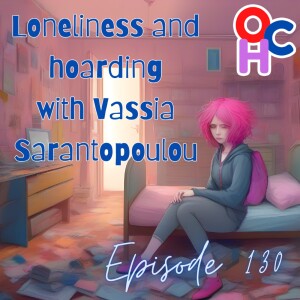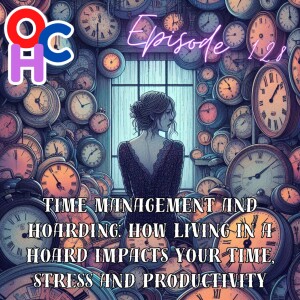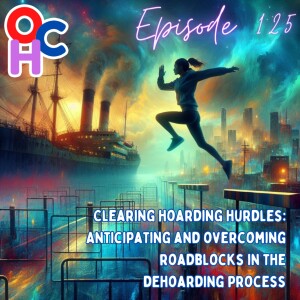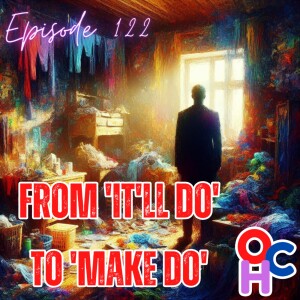That Hoarder: Overcome Compulsive Hoarding
Hoarding disorder is stigmatised and people who hoard feel vast amounts of shame. This podcast began life as an audio diary, an anonymous outlet for somebody with this weird condition. That Hoarder speaks about her experiences living with compulsive hoarding, she interviews therapists, academics, researchers, children of hoarders, professional organisers and influencers, and she shares insight and tips for others with the problem. Listened to by people who hoard as well as those who love them and those who work with them, Overcome Compulsive Hoarding with That Hoarder aims to shatter the stigma, share the truth and speak openly and honestly to improve lives.
Episodes

Friday Mar 08, 2024
Friday Mar 08, 2024
Subscribe to the podcast: https://www.overcomecompulsivehoarding.co.uk/subscribeEpisode transcript: http://www.overcomecompulsivehoarding.co.uk/Today, I look at the link between loneliness and hoarding behaviour with special guest Vassia Sarantopoulou, an expert psychologist and relationship counsellor. Come on a thought-provoking journey as Vassia and I discuss the complexities of loneliness, and practical steps for combating the shame associated with hoarding. There's the deep impact of societal expectations on emotional expression and emphasise the importance of forming genuine human connections for those affected by hoarding.From identifying warning signs of loneliness to exploring the link between trauma, grief, and hoarding, this episode offers insights into the struggles faced by individuals dealing with compulsive hoarding and the loneliness that often accompanies it. Vassia shares effective strategies for overcoming loneliness, reaching out for support, and finding ways to rebuild connections when you hoard.This episode is a candid and compassionate exploration of the intersection between loneliness and hoarding, offering support for those seeking to break the cycle.Loneliness and Its ImpactStigma and Misconceptions Surrounding LonelinessTwo Layers of Loneliness: Normal Feeling vs. Deeper Sense of LonelinessCommon Causes of LonelinessOvercoming the Fear of Rejection and Making New FriendsDifficulties in Discussing Personal Struggles with FriendsImportance of Creating Safe Spaces for Discussing Grief and Negative EmotionsCombatting Shame and Overcoming Self-JudgmentSteps to Combat Shame Associated with Hoarding BehaviourImpact of Societal Expectations on Emotional ExpressionBuilding Human Connections and Combatting Feelings of Shame Associated with Hoarding BehaviourPractical Steps to Build Human Connections and Combat Feelings of Shame Associated with Hoarding BehaviourAddressing Shame and Overcoming Self-Imposed Judgment Related to HoardingGradual Approach to Disclosing Hoarding in RelationshipsPractical Advice and ResourcesPurpose of Social Activities: Engaging in Activities to Reduce Pressure and StressBuilding Relationships and Disclosing Hoarding: Choosing the Right Moment and Managing ExpectationsTaking a Gradual Approach to Disclosing Hoarding in RelationshipsImpact of Hoarding Symptoms on LonelinessWarning Signs of Loneliness and IsolationMental and Physical Health Effects of LonelinessSeeking Harmful or Unhealthy Relationships Due to LonelinessThe Contribution of Trauma, Grief, and Loss to Hoarding Behaviour and LonelinessDual layers of loneliness lead to isolation.Loneliness stems from disconnecting from ourselves.Impact of loneliness mental and physical health.Loneliness and trauma can lead to hoarding.Reconnect with old friends, join social groups.Healing involves selective sharing and seeking help.Guide, allow time, ask, express, connect authentically.Layered loneliness: valuing connections, deeper isolation, worthiness doubts, fear, rationalisation.Relying solely on objects for emotional needsNeglecting physical appearanceChanges in sleepLoss of interest in activitiesHopelessness or helplessness.Traumatic experiences can lead to hoarding and social isolation as a protective mechanism.People in healing choose carefully who to share with Hosted on Acast. See acast.com/privacy for more information.

Friday Mar 01, 2024
Friday Mar 01, 2024
Subscribe to the podcast - https://www.overcomecompulsivehoarding.co.uk/subscribeToday, I'm looking at psychological flexibility and rigidity with Dr. Jan Eppingstall. Join us as we explore the impact of changing hoarding behaviours and learn about Acceptance and Commitment Therapy (ACT) as a powerful tool in addressing psychological inflexibility. Discover the six core processes of psychological flexibility and inflexibility, and gain insights into challenging rigid beliefs. We'll also discuss the role of curiosity and acceptance in fostering adaptability and open-mindedness. So, grab your headphones and get ready for an enlightening conversation on embracing change and overcoming psychological rigidity.Importance of Psychological Flexibility in HoardingPsychology inflexibility's role in hoarding behaviourImpact on life satisfactionApplication to all humans, not just clinical pathologiesAcceptance and Commitment Therapy (ACT) as a Model for Psychological Adaptability and HealthThe 6 core processes of psychological flexibility and inflexibilityAcceptance vs. experiential avoidanceDiffusion vs. cognitive fusionFlexible attention to the present moment vs. inflexible attentionSelf as context vs. attachment to conceptualised selfCommitted action vs. inactivity or impulsivityHexaflex and its originChanging BehavioursTrying new things, compromising, and risk-takingChange in one area affecting various aspects of lifeTechniques for Managing Panic AttacksAddressing panic attacks through curiosity and acceptanceHealing experience of being understood and acceptedMacro and Micro PerspectivesTechniques such as meditation or mindfulness"Yes, And" Technique and Promoting Open-MindednessRole in promoting compromise and open-mindednessImportance of considering alternatives with a curious and open mindHoarding, rigidity, and psychological inflexibilityExperiential avoidance and ruminationInflexible actionsAdapt to different situations while staying true to your valuesTaking action towards values, maintaining psychological flexibility.Practice observing your thoughts through thought listingWorking on being less rigid, more flexible.Mediation in statistical analysis.Consider alternatives, embrace curiosity.Finding flexibility in perspective improves relationshipsValues to guide actions.Acceptance, understanding, and support from trusted individuals.Discussion on rigidity and inflexibility in hoarding, its correlation with various mental health issues.ACT academics aimed to create unified therapy model, different from DSM.Living in state of inaction, choosing values for action.Experiential avoidance, cognitive fusionACT for hoarding.Questioning negative thoughts, being psychologically flexible, and testing beliefs to overcome attachment to possessions.Flexibility vs. avoidance in behaviour and mindset.Awareness of thoughts and feelings helps in making wise decisions.Being creative and adaptable in different contextsPeople may act differently in various situations, but there is a constant sense of self.Neurodiversity may impact ability to visualize or notice thoughts.Struggling with rigidity and flexibility, challenging it.Questioning values, flexibility, and inflexibility in decision-making and life choices."Yes, and."Actions not matching with valuesThought listing exercise to align with values. Hosted on Acast. See acast.com/privacy for more information.

Friday Feb 23, 2024
Friday Feb 23, 2024
Subscribe to the podcast - https://www.overcomecompulsivehoarding.co.uk/subscribe Hosted on Acast. See acast.com/privacy for more information.

Friday Feb 16, 2024
Friday Feb 16, 2024
Subscribe to the podcast - https://www.overcomecompulsivehoarding.co.uk/subscribeI take a look at the time-consuming nature of living in a hoard, including the impact of clutter on daily life. I cover the stress, procrastination, and decision fatigue that come with hoarding to shed light on the ways in which hoarding not only affects our living spaces but also consumes valuable time. Tune in for a candid conversation that challenges perceptions and offers a fresh perspective on the journey to overcome compulsive hoarding.Questioning time for tidying in a cluttered life. Gradual realisation about time consumption.Tidying takes time, hoarding takes longer.Organising the kitchen, decluttering, and categorising food items.Knowing where things are saves time.Reducing possessions saves time and effort.Hoarding makes cleaning harder and time-consuming.Rethink hoarding, liberate yourself, save future time.American society invented the concept of human failure.Organising saves time and reduces clutter.Having too much stuff makes cleaning difficult and time-consuming.The burden of hoarding and time wastedReframing thoughts to improve decluttering.The concept of human failure was an American invention due to a capitalist society.The misconception of tidy people spending all their time cleaning and tidying.The realisation that living in hoarding is time-consuming due to the difficulties caused by clutter.The Impact of Hoarding on Daily LifeThe stress and time wasted in finding everyday items in a hoarded home.Decision-making process and procrastination caused by overwhelming clutter.Cleaning Challenges and Time ManagementThe additional time required for cleaning and maintenance in a hoarded home.The difficulty of keeping a hoarded home clean compared to a neat and tidy home.The liberating aspect of dehoarding by freeing up time for the future. Hosted on Acast. See acast.com/privacy for more information.

Friday Feb 09, 2024
Friday Feb 09, 2024
Subscribe to the podcast - https://www.overcomecompulsivehoarding.co.uk/subscribeToday, I am joined by the insightful Paige Pritchard, a money coach and the owner of the Overcoming Overspending community. Together, we dig into the complexities of overspending, addressing its emotional roots and psychological impact on individuals' lives. Paige offers invaluable insights into understanding the deeper motivations behind spending habits and emphasises the need to reclaim control and satisfaction in life. We discuss practical strategies, such as the "urge jar" to create distance from impulsive buying and find fulfilment without overspending. Join us as we explore the psychological effects of spending habits and discover empowering approaches to overcome overspending.Overspending definedImpact of shopping on time, relationships, confidence.Men face stigma for impulse spending, too.Striving for perfectionProducts tied to identity and feelingsResist urge to splurgeAnticipation brings more pleasure than actual events.Recognise brain's responseIndividual approach: abstainer vs moderator.YNAB for budget transparency.Budgeting software provides helpful transparency for planning.Impact of shopping on time, relationships, and financial confidence.Perfectionism and spending habitsConsumerism links products to identities and emotionsDelay impulse buyingBaseline awareness of brain's response to threatsNo spend challengesPersonal spending behaviourSigns of overspendingFinancial implicationsTime spent on shopping and acquiringImpact on relationshipsFinancial self-confidenceImpact on environment and clutterUnderstanding Motivations and Emotional Experiences Behind Spending Aspirational spendingConsumer cultureDeeper motivations behind spending habitsImpact of spending habits on psychological wellbeingDeeper reasons behind excessive spendingRegaining a sense of controlEscaping lifeManaging Impulse BuyingScarcity Spending The "urge jar" as a toolForm a new habit loopDopamine without spending money.Fear of missing outManaging RegretDecision MakingInevitability of emotionsImplications of extreme approaches.Budgeting softwareManaging annual expensesPsychological perspective behind impulsive buyingCreating distance before making a purchase.Impact of social media on contributing to overconsumptionDownplaying shopping addiction.The seriousness of shopping addiction and its effect on people's lives, especially for women. Hosted on Acast. See acast.com/privacy for more information.

Friday Feb 02, 2024
Friday Feb 02, 2024
Subscribe to the podcast - https://www.overcomecompulsivehoarding.co.uk/subscribeToday with Dr Jan Eppingstall I explore the nuanced concept of insight in hoarding. From defining overvalued ideation to understanding the levels of insight, we unravel the challenges individuals face in recognising and addressing their hoarding behaviours. Through personal experiences, expert advice, and valuable research insights, this episode sheds light on personalised treatment approaches, effective communication strategies, and the importance of empathy and compassion. Get ready to gain a deeper understanding of hoarding disorder and discover practical ways to support individuals on their journey to overcoming compulsive hoarding.Insight into HoardingLevels and Types of InsightInsight Variability Among IndividualsFactors Influencing Insight (e.g. Comorbidity, Trauma, Life Experiences)Insight Study by Helena Drury and ColleaguesInsight in Diagnosis of Hoarding DisorderRelationship Between Hoarding Severity, Self-Criticism, Shame, and Preservation of Self-ConceptOvercoming Clutter BlindnessGetting Rid of Things and Challenging ThoughtsTaking Photographs of Living SpacesVulnerability in Showing Spaces to Someone ElseExposing Oneself to Getting Rid of Things and Challenging ThoughtsIdentifying and Addressing Lack of InsightAnosognosia and Overvalued IdeationReflecting Feelings and ThoughtsThe LEAP Technique for Support People, Coaches, and TherapistsUnderstanding Hoarding BehaviourMotivations Behind Hoarding TendenciesDefensive Denial and Psychological ReactanceDemographics and Characteristics of Hoarders in Research Settings and Community ServicesNeurocognitive Damage and Insight into Hoarding BehaviorCommunication and Approach in Supporting HoardersValidating Concerns and Correcting MisunderstandingsEmpathetic and Compassionate ApproachUsing "Yes, And" Technique in ConversationsTailoring Therapy Approach for Hoarding ClientsTreating things as an ExperimentImportance of Curiosity and Playfulness in Therapy ApproachLimitations of Manualised Treatments Hosted on Acast. See acast.com/privacy for more information.

Friday Jan 26, 2024
Friday Jan 26, 2024
Subscribe to the podcast - https://www.overcomecompulsivehoarding.co.uk/subscribeBy acknowledging potential roadblocks ahead, we can prepare emotionally and practically for upcoming challenges and even get more efficient when we’re dehoarding. I talk about the importance of being proactive, realistic, creative and adaptable when facing obstacles, while also seeking professional support when needed. I look at the need for planning, prioritising, and breaking down tasks into smaller chunks to overcome difficulties. Anticipating obstacles improves efficiency and motivation.Anticipating challenges leads to proactive decision-making.Anticipate obstacles, reflect, and evaluate for success.Stay open to possibilities, prepare for obstacles.Planning can overcome mental obstacles for success.Preparing for challenges in dehoarding process.Anticipate challenges and plan preventive measures.Allow yourself rest, plan ahead, ask for help.Anticipating obstacles while working. Subconscious problem-solving.Anticipating obstacles improves efficiency and reduces discouragement.Anticipating challenges improves decision-making, reduces panic. Being proactive is key.Planning to deal with nostalgic stuff eventually, while focusing on current tasks and building up decluttering skills.Anticipate and adapt to obstacles, focus on progress rather than completion. Reflection and objective evaluation are key.Stay open to possibilities, prepare with needed supplies, seek advice on overcoming obstacles from others.Address decision fatigue, burnout, and overwhelm to avoid stops and starts and make consistent progress.Prepare for challenges, gain confidence from past experiences.Anticipate and prevent burnout by pacing work, taking breaks.Take days off even if it feels wrong. Plan ahead and seek help.Tip for calming mindImportance of Anticipating ObstaclesBenefits of problem-solving and emotional preparednessImproving efficiency and momentum in the decluttering processAssisting in planning, prioritising, and decision-makingOvercoming ChallengesDifficulty of anticipating obstacles, particularly for novicesLeveraging experience to anticipate and surmount obstaclesAdaptability, creativity, and flexibility in addressing anticipated obstaclesThe value of trust, resourcefulness, and forward planningNostalgic items as potential distractions and triggersThe importance of realistic goal setting and objective evaluationAnticipating Logistical ChallengesEnsuring necessary supplies are availableLearning from others' experiences with obstacles and their solutionsImportance of planning, breaking down tasks, and consistent progress Hosted on Acast. See acast.com/privacy for more information.

Friday Jan 19, 2024
Friday Jan 19, 2024
Subscribe to the podcast - https://www.overcomecompulsivehoarding.co.uk/subscribeToday I delve into my experiences of overcoming avoidant behaviours when it comes to decluttering. I share how the Hummingbird Method has been instrumental in breaking down the fear and anxiety associated with tackling daunting hoarded areas.Join me as I explore the power of gentle, gradual progress and the freedom that comes from challenging rigid beliefs and behaviours. New method for managing tasks: hummingbird method.Overcoming fearsUse the hummingbird method to beat procrastination.Versatile method adaptable for different tasks and problems.Challenging rigid beliefs to overcome hoarding habits.Experiment, try new things, open new doors.Gentle approach to tasks.Change is necessary for progress.Trying new things, starting small.Understanding the Difficulties of Letting GoThe fear and difficulty involved in letting go of hoarded itemsThe sense of freedom and positive change that can result from letting goExploring hummingbirdingOvercoming inflexible behavior and thinking through the hummingbird methodThe daunting piles were not as intimidating as imaginedChallenging limiting rules and stepping into avoided areas to confront tasksEmbracing a New ApproachEncouragement to experiment and try new ways of approaching difficult tasksStarting with small steps, such as opening the cellar doorThe passive nature of the "Hummingbird method" in breaking down avoidance barriersComparison to a kitten gradually expanding boundaries to become more comfortableApplying the Hummingbird MethodUsing the method to tackle fears and avoidance behavioursGradually familiarising yourself with daunting tasks or situationsIllustrative examples of avoiding tasks and gradually confronting themComparing the method to a child overcoming a fear of balloons at a partyThe importance of flexibility and openness in challenging rigid beliefs and behavioursOne tool in a range of strategiesRecognising that there is no one-size-fits-all solution for overcoming hoarding and avoidance behaviours Hosted on Acast. See acast.com/privacy for more information.

Friday Jan 12, 2024
Friday Jan 12, 2024
Subscribe to the podcast - https://www.overcomecompulsivehoarding.co.uk/subscribeIn today's episode, I delve into the emotional impact of emergency dehoarding. Over the last few weeks, I've faced the daunting task of decluttering my home in preparation for an impending electrical testing. I explore the rollercoaster of emotions, from terror and shame to motivation and determination, as I grapple with the challenges of addressing my hoarding situation. Join me as I uncover the journey of navigating through the paralysis and panic to making progress, all while acknowledging the emotional and physical toll of the process. Stay tuned for practical insights, personal revelations, and a determined commitment to moving forward and not slipping back.Overcoming fear and making progress step-by-step.Planned time off and charity donation preparation.Anticipated shame, ensuring access, fluctuating emotions.Continual progress and proactive cleanup mindset.Therapist support pivotal.Overcoming challenges with tools and focus.Cannot sustain that intensity, but need to keep moving.Making rooms accessible.Overcoming challenges one step at a time, managing panic and making progress amid fear.Took time off, arranged charity collection.Struggling with hoarding shame, balancing pragmatism and terror.Focus on forward movement and addressing small tasks promptly.Realising the value of decluttering and talking to therapist.Facing challenges, equipped with tools and deadline.Unable to sustain pace, seeking balance and progress.Despite challenges, maintaining progress is beneficial in the long run.The emotional impact of emergency dehoardingParalysis and panic when faced with the task of dehoarding the houseOvercoming initial resistance and taking gradual action to prepare for impending electrical testingManaging emotions of terror, shame, and exhaustion during the processFinding motivation in focusing on progress and benefits of a cleaner homeCoping with difficult tasks by reminding myself that it all had to be doneCreating a loose daily plan to guide effortsBooking a charity collection for excess belongings providing practical assistance and motivationAcknowledging the imperfect nature of the donation process but recognising its necessityThe role of support from a therapist and knowledge gained from a podcast about hoarding in managing the processDeveloping a "toolbox" of knowledge and strategies through podcast, interviews, research, and listener storiesThe benefits of having a deadline to stay focused and make progress in the hoarding situationReflecting on the improved hoarding situation and the emotional and physical toll of the processAcknowledging the progress made and the determination to continue moving forward and not slip backMaking a conscious effort to avoid reverting to old habits, aiming to maintain balance and not let up on efforts to overcome compulsive hoarding Hosted on Acast. See acast.com/privacy for more information.

Friday Jan 05, 2024
Friday Jan 05, 2024
Subscribe to the podcast - https://www.overcomecompulsivehoarding.co.uk/subscribeAfter a year where my subverted phrase of the year was "it'll do", I talk about how I'm hoping to continue shedding perfectionism and learn to be more resourceful and adaptable. Tune in to hear all about it. 2023 phrase "it will do" calms my perfectionist anxietyStriving for tidiness, resisting hoarding tendenciesRetiring items when its purpose has been fulfilledEmbracing "it'll do" mentality for 2023 led to less stress and overthinking, allowing for more focus on important things.Hoarders struggle with using what they have, but I'm seeking to become more adaptable and resourceful.Facing challenges in decluttering, balancing desire for tidiness and fear of letting go.Desire to reduce waste, finding satisfaction in finishing products.Examples of how "it'll do" helped me make decisions and reduce stress.Introduction of the new phrase for 2024, "make do," which emphasises resourcefulness and adaptability.The influence of financial awareness in choosing the new phrase.Desire to engage more with possessions.Exploring the contradiction in hoarders' tendencies to find multiple uses for items to justify keeping them but not being resourceful in other ways.The impact of perfectionism on the desire for the "perfect" item and the challenge to accept what is adequate.The potential risk of using "make do" as an excuse to keep everything and the need for balance.The acknowledgement of challenges in embracing "make do" and the importance of trusting the process.Finding pleasure in finishing and using up items as a result of a shift in perspective.Personal examples of feeling a sense of achievement in using items fully.Comparing the emotional attachment to well-used items versus unused items.The aim of "make do" to encourage thoughtful use of possessions and sustainable engagement with them. Hosted on Acast. See acast.com/privacy for more information.










